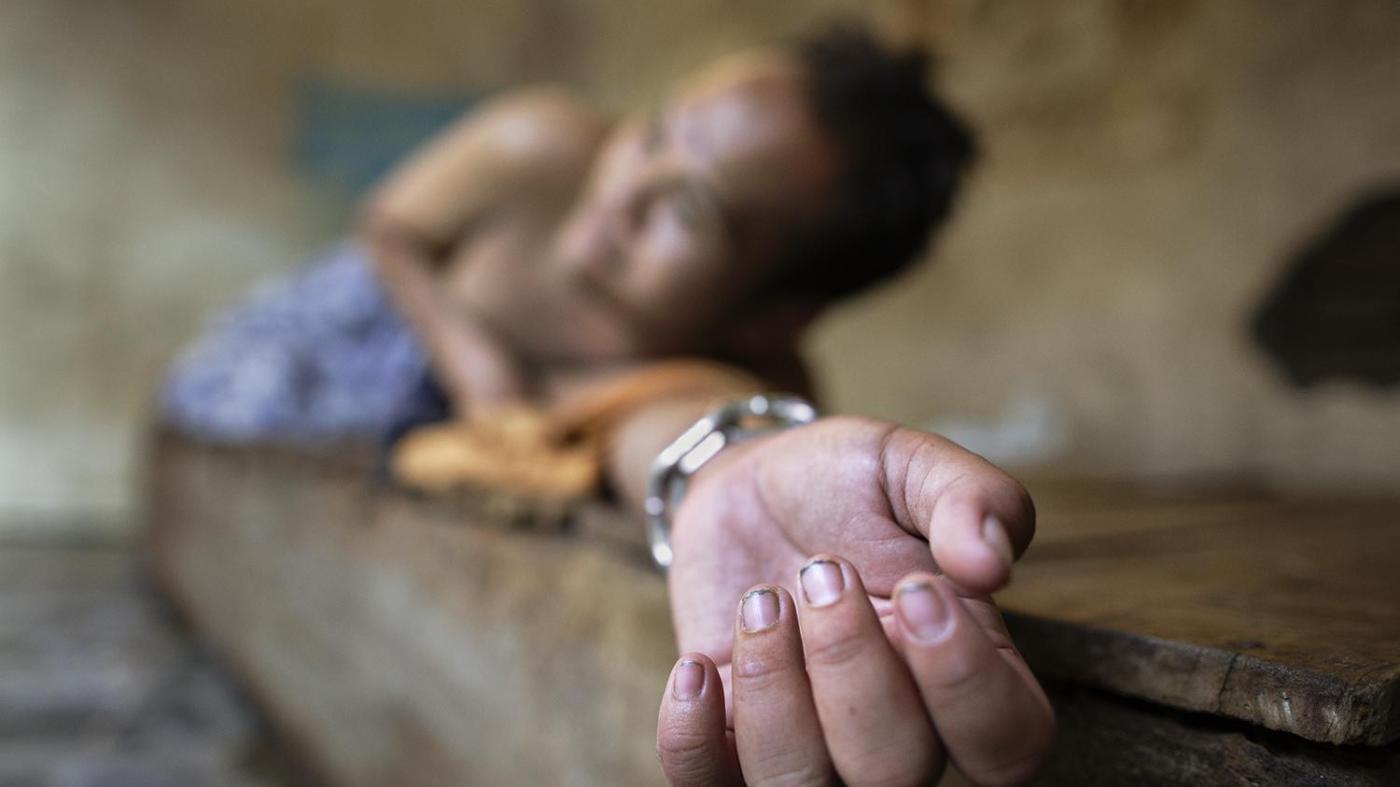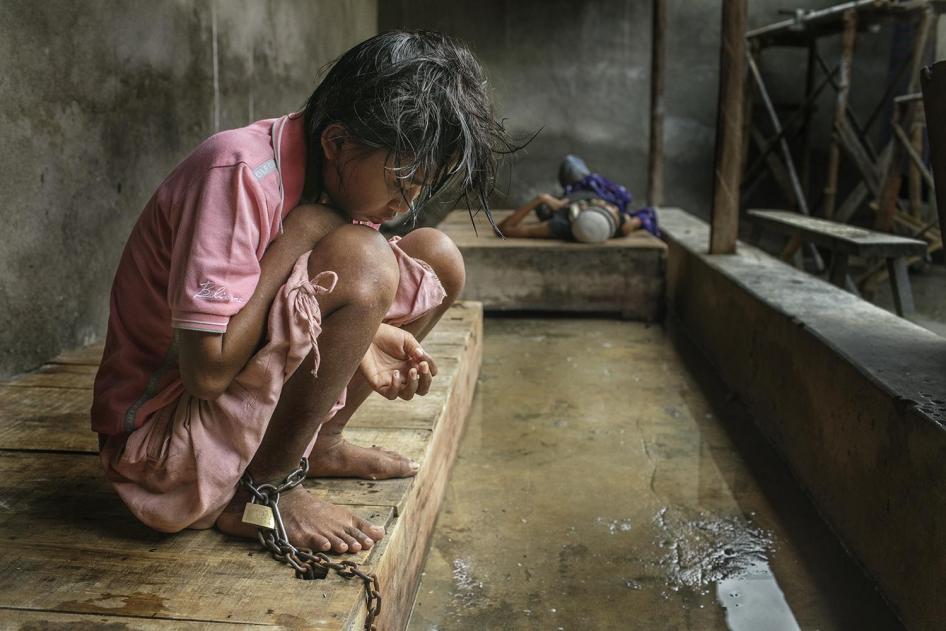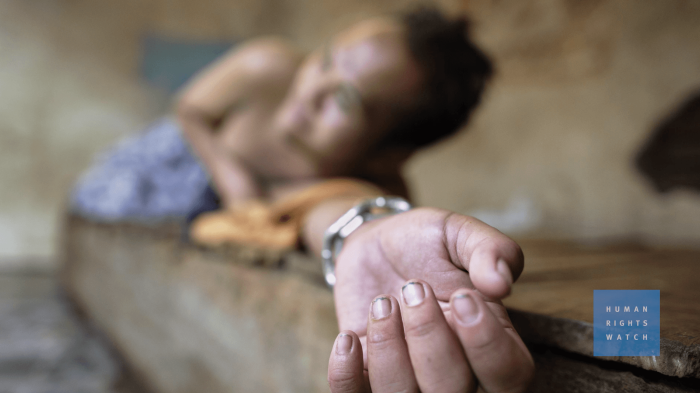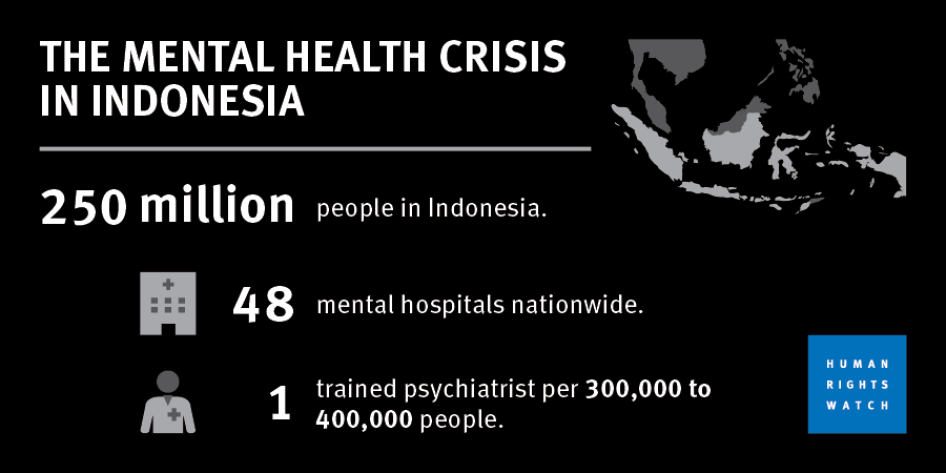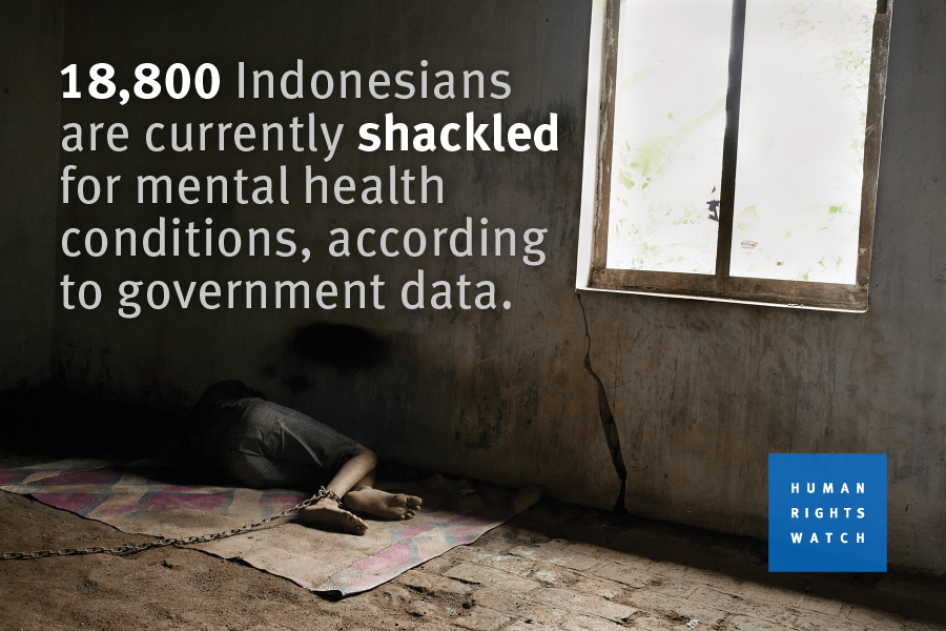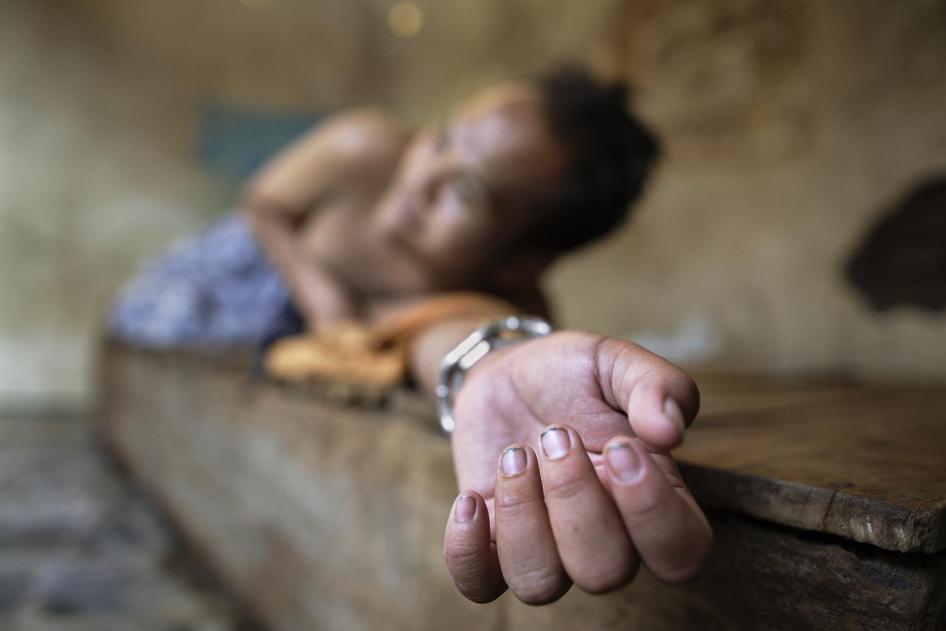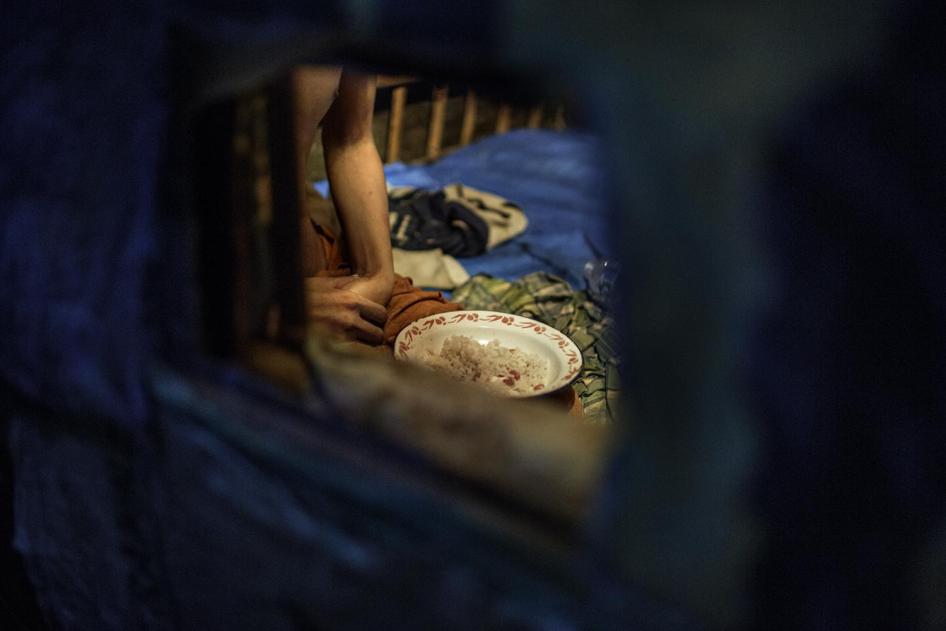More than 57,000 people in Indonesia with mental health conditions have been chained and locked up in overcrowded rooms or filthy sheds at least once in their lives. About 18,000 are still believed to be shackled, despite a 1977 government ban on pasung, as the practice is called. Access to support and mental health care is desperately needed. Yet with only 48 mental hospitals for the country’s 17,000 islands, families continue to either admit relatives with psychosocial disabilities without their consent to institutions where they are subjected to a wide range of abuses or to chain or lock them up at home.
Human Right Watch’s Kriti Sharma visited 18 mental hospitals, social care centers and private institutions run by faith healers or traditional healers and interviewed about 150 people across Indonesia’s heavily populated islands of Java and Sumatra. Her new report, “Like Living in Hell” for the first time gives those who have been locked up for years a voice. It was her toughest research project so far, she tells Birgit Schwarz.
What did you find in the institutions you visited?
Overall, we found evidence of arbitrary detention, physical and sexual violence, forced seclusion and forced contraception as well as involuntary treatment including electroshock therapy without anesthesia. But conditions differed depending on the type of institution.
While mental hospitals were for the most part very clean, social care institutions were overcrowded and unsanitary. In one institution I had to tiptoe over women’s limbs to enter a room that was meant for 30 people, but that accommodated 90 women. The toilet was an open drain inside the room. Lice were rampant and many had scabies, which in these overcrowded conditions becomes very infectious.
In the healing centers we visited, people were chained. They had a 2-to 4-meter radius to move, defecate and urinate. They were not allowed to bathe. Instead a bucket of water would be thrown on them once a day.
We also found evidence of forced seclusion as punishment. If people didn’t obey the staff, if they didn’t take the medication they were ordered to take, if they had any form of sexual interaction with fellow residents, they would be put into isolation, sometimes for up to a month, sometimes longer.
The situation for women was particularly bad. Especially when women are chained or put in isolation, the risk of physical and sexual abuse is very high. In one case a woman told me that a male staff member had touched her vagina that very morning just for fun. She was chained, so she could neither move away nor defend herself, and there was no one to complain to.
Were those who lived at home better off?
In homes the situation was just as bad. I found people chained and locked up in sheep shelters or chicken coops. I met a man who was five feet eleven inches tall who was kept in a tiny sheep shed for one month. The ceiling was too low for him to stand. His mother would give him food through a hole in the wall. He was naked, because the family thought it would be cleaner if he relieved himself without clothes. And he never bathed throughout his confinement nor did he receive any medical care.
How long would people be kept locked up like this?
The worst case we found was a woman who was locked up for 15 years, defecating, urinating, eating in the room where she was kept. She was locked up because she had been raiding the neighbors’ crops. As the father was tired of having to pay for the damages, and the advice of traditional healers did not improve her condition, he decided to lock her up in her own house.
The windows had been partially boarded up, so it took a while for my eyes to adjust to the darkness. But then I saw this woman crouching on the floor, completely naked, amid a pile of rubble. She was so desperate to get out that she had used one of the stones that kids in the neighborhood had been throwing at her to break down the cement floor and try to dig her way out. When her parents found out they tied her hands behind her back. As she could no longer use her hands, she had to bend down until her head touched the floor to eat. She had lost the use of her legs too. She basically had to crawl and crouch on the floor. She has now been released.
Why is shackling still so widespread despite being banned for almost 40 years?
It happens when families feel they have no alternative. There is only one psychiatrist per 300,000 to 400,000 people in Indonesia and there are no mental health care support services in the community. Plus, there is little awareness about mental health and a lot of superstition.
People often think that mental health conditions are a result of a sin or a curse, that these people are possessed by evil spirits or the devil. Families will first seek a traditional healer to find a solution to this “supernatural” problem. If that does not work, they will lock up those with psychosocial disabilities or chain them. In many cases the person has not committed a single violent act.
Would some of the people you interviewed be able to manage their own lives, if provided with the right support?
People who have been chained for many years are not always in a condition to go back to a productive life. They had their dignity so completely stripped from them that they do not even want to speak. However, when provided with the right support and services, their condition improves rapidly.
I met a 29-year-old woman who had been locked up in a goat shed by her father. She was released and went to a mental hospital, where she got access to mental health support and to medication. Now she is back home and runs a business selling fermented soya bean cake at a roadside stall. And yet she lives in fear of being put back in the goat shed.
How is someone actually diagnosed with a psychosocial disability?
You will only be diagnosed if you have been to a mental hospital or if you find a psychiatrist in the community. Most people we met never had access to mental health care. Most have never been to a doctor, never had any diagnosis. The family or the neighbors decide that someone is “crazy” and that they need to be locked up.
How much control do people with a psychosocial disability have over what happens to them?
People with psychosocial disabilities have no right under Indonesian law to oppose their detention. Anyone who is found on the street, who is talking incoherently, wandering aimlessly, or doing things that do not conform can be picked up by the local police and taken to a center and left there. The social affairs department knows that there is no access to mental health care or even medical care for that matter in these centers. The only form of "treatment," if you can call it that, are baths under the moonlight, painful massages with stones, or herbal concoctions. But because superstition and stigma are so common, even local officials think of psychosocial disabilities as a problem involving evil spirits, not mental health.
Why was this your toughest report so far?
I have worked on sexual violence and armed conflict, on child abuse, on issues that I thought were emotionally or psychologically difficult. But never have I been confronted with such horrific living conditions, such inhumanity. The thought that someone has been living in her own excrement and urine for 15 years in a locked room, isolated, never seeing her friends, and not given any care whatsoever is just horrifying. There are just no words to describe what a person is going through if they have been s reduced to a state that is worse than for an animal, So many people told me “This is like living in hell.” It really is.
What has the Indonesian government done to end shackling?
Indonesia has been working to do away with the practice. It has l an anti-shackling campaign and has made an effort to create awareness about this issue. The country has ratified the Convention on the Rights of Persons with Disabilities. A disability rights bill is pending in parliament. Government regulations provide that mental health should be integrated into primary health care. And rescue teams have been created that are supposed to free people from shackling. However, because Indonesia has such a decentralized political system, implementation at the local level is very weak.
What more should be done?
First, the government needs to ensure that pasung is abolished by monitoring government and private institutions that continue this practice. Second, it needs to amend the Mental Health Act of 2014 to ensure that people with psychosocial disabilities have the same rights as everybody else. Third, the government needs to revise and pass the Rights of Persons with Disabilities Bill. The government also needs to develop adequate and accessible community-based support and services, including mental health care, in consultation with people with psychosocial disabilities themselves as well as train mental health workers, from nurses to psychiatrists. Finally, it needs to engage communities in more, and more effective, awareness campaigns to do away with the stigma people with psychosocial disabilities in Indonesia face.
This interview has been edited and condensed.
